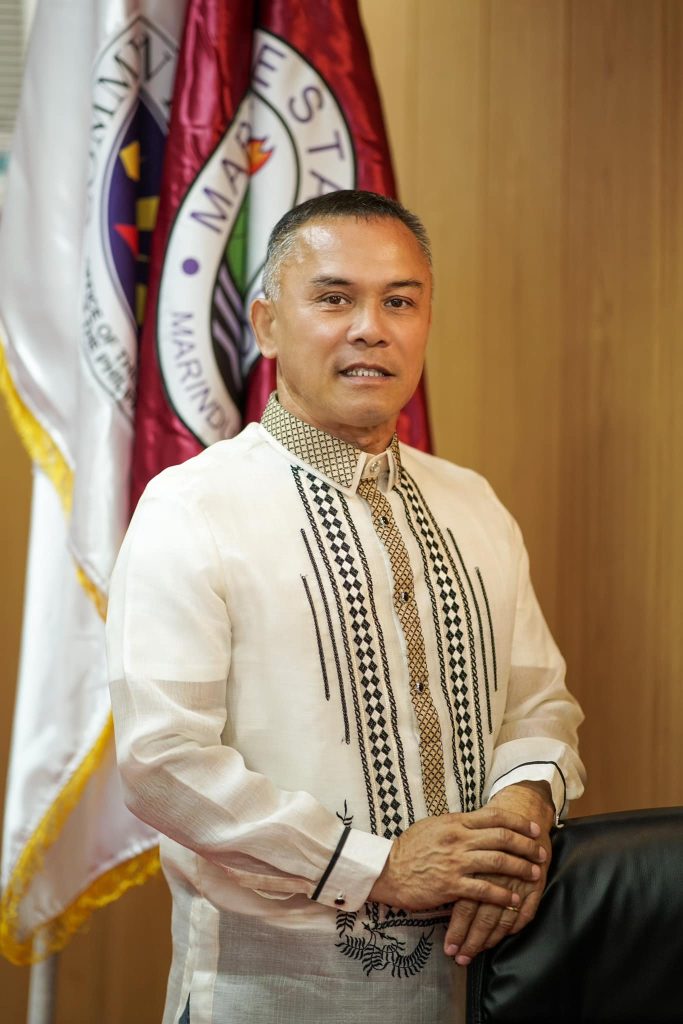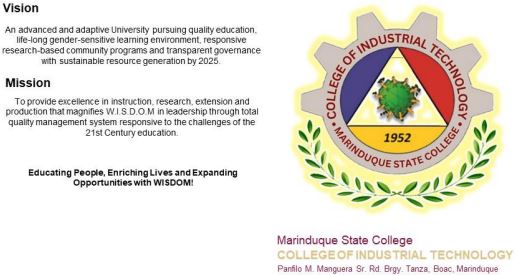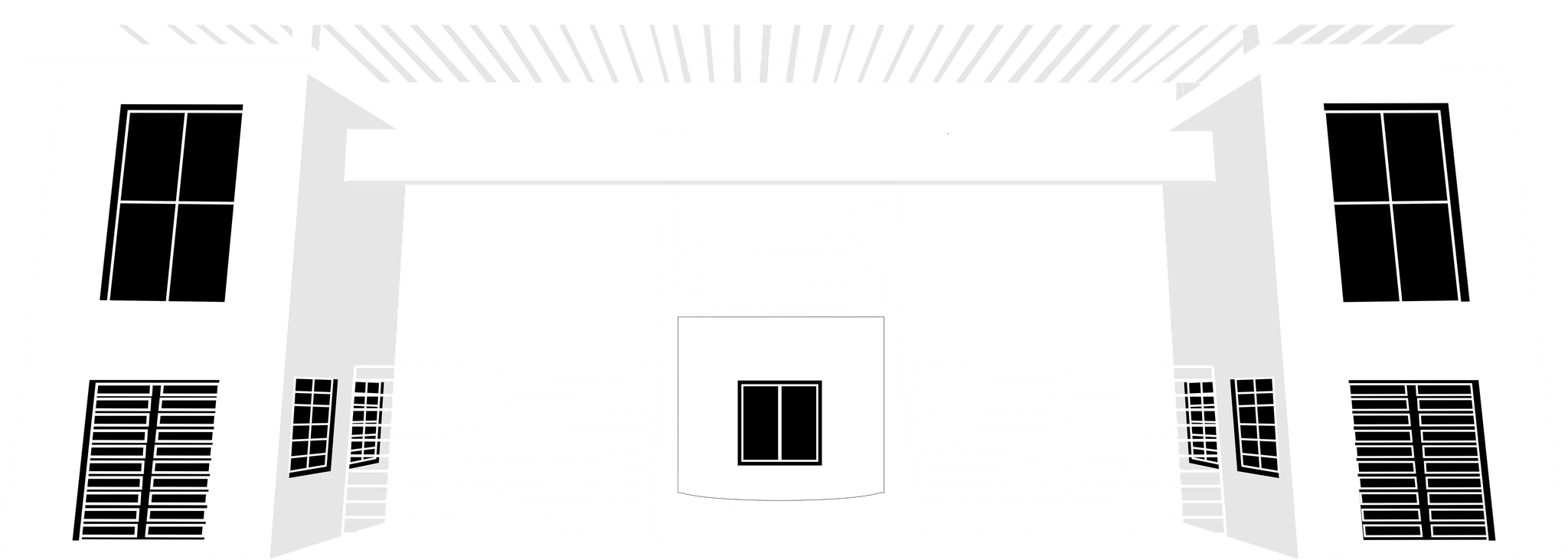About Us

Mr. Mario T. Mascareñas
Dean
When Marinduque State College was established in 1952 as Marinduque School of Arts and Trades by virtue of Republic Act 805, the School had been operating the two-year Technical Curricula. During that year, Industrial Technology was a separate section which was headed by Mr. Respicio A. Javier. The following courses were offered at the time: Technical Automotive Mechanics, Technical Building Construction, Technical Drafting, Technical Electricity, Technical Cosmetology, Garments Trades and Technical Food Trades.
In Academic Year 1975 – 1976 the Department of Education Culture and Sports (DECS) Order No. 28 s. 1975 authorized the school to offer the four-year Bachelor of Science in Industrial Technology Curriculum (BSIT).
During the term of College President Dr. Rodrigo G. Monterey Sr., a new organizational structure was created that paved the way for the merging of the two largest sections of the College: Engineering and Technology to become the School of Engineering and Technology (SET).
By AY 2005 – 2006, during the term of College President Dr. Romulo H. Malvar, Technology was separated from Engineering and became a separate School, the School of Industrial Technology (SIT) that offered a two-year craftsmanship curriculum, a three year Technician program and a four-year Bachelors’ degree.
During the term of College President Dr. Merian P. Catajay-Mani, a new organizational structure was created with the School of Industrial Technology merging with the School of Information and Computing Sciences and became known as the School of Technology (STech), but by 2020, the Industrial Technology program was again separated to become what it is today, the School of Industrial Technology.
Graduates of the Bachelor of Science in Industrial Technology are expected to become highly-skilled and ethically and socially responsible industrial technologists.
Bachelor of Science in Industrial Technology
Level III Re-Accredited by the Accrediting Agency for Chartered Colleges and Universities in the Philippines (AACCUP), Inc.
Our Curriculum
Automotive Technology
- Basic Technology Process
- Electricity and Electronics
- Power Train
- Defensive Driving and Troubleshooting
- Automotive Air-Conditioning
- Engine Overhauling and Rebuilding
- Automotive Shop Supervision and Management
Drafting Technology
- Drafting Room Practices and Elements of Mechanical Drawing
- Applied Working Drawing
- Machine and Furniture Layout and Details
- Architecture Layout and Details
- Creative Architecture Layout and Details with CAD
- Structural and Electrical Layout and Details using CAD
- Sanitary, Plumbing, and Mechanical Layout and Details using CAD
Electrical Technology
- Electrical Installation for Single-Occupancy
- Commercial and Industrial Wiring System
- Transformers and Direct Current Motors
- Alternating Current (AC) Motors and Machines
- Basic Motor Control
- Instrumentation and Industrial Electric Controls
- Industrial Electronics and Automated Systems
Food Technology
- Food Fundamentals and Nutrition
- Food Processing and Preservation
- Experimental Cookery
- Baking and Cake Decoration
- Culinary Arts
- Food Processing Management
- Food Production and Food Shop Operation
Mechanical Technology
- Basic Technological Processes
- Foundry and Sheet Metal Works
- Mechanical Assembly and Welding Processes
- Machining Operations
- Milling and Modern Machining Operation
- Machine Shop Automation
- Quality Control and Shop Management
Welding and Fabrication Technology
- Basic Technological Processes
- Metallurgy and Welding Processes
- Oxy Acetylene Welding and Print Reading
- Advance Welding Processes
- Pipe Welding and Print Reading
- Welding Inspection Technology
- Advance Welding and Joining Technology
| SUMMARY | NO. OF UNITS |
|---|---|
| Specialization Courses | 49 |
| On-the-Job Training/Practicum | 20 |
| General Education Elective Courses | 12 |
| General Education Courses | 24 |
| Mandated Courses | 17 |
| Professional and Management Courses | 33 |
| Applied Science and Tool Courses | 23 |
General Education Courses
- Understanding the Self
- Mathematics in the Modern World
- Readings in Philippine History
- The Contemporary World
- Ethics
- Purposive Communication
- Science, Technology and Society
- Art Appreciation
Mandated Courses
- Life and Works of Rizal
- Movement Competency Training
- Exercise-Based Fitness Activities
- Individual/Dual Sports
- Group Games/Team Sports
- National Service Training Program
General Education Elective Courses
- Occupational Safety and Health
- Environmental Science
- Gender and Society
- Human Reproduction
Applied and Tool Courses
- Fundamentals of Technical Sketching
- Computer Concepts and Fundamentals
- Chemistry for Industry Technology
- Advance Technical Sketching with Blueprint Reading
- Applied Computer
- Mechanics and Heat
- Basic Working Drawing
- Electromagnetism, Lights and Optics
- Details Assembly Drawing with CADD Application
- Statistics and Probability
- Drawing Applications
Professional and Management Courses
- Industrial Mathematics
- Project Planning and Evaluation
- Thesis 1 and 2
- Industrial Economics and Fundamentals of Cooperative
- Industrial Psychology
- Work Ethics
- Entrepreneurship with Basic Accounting and Bookkeeping
- Industrial Organization and Personal Management
- Labor Code and Taxation
- Technopreneurship
Our Partners
Host Training Establishments for Student Internships
- Construction Line Engineering
- Auto Serv All Parts and Services, Inc.
- Flavorcrest International Corporation
- Provincial Government of Marinduque
- Marinduque Electric Cooperative
- Long Industries Philippines, Inc.
- RGJ Electrosystem Consultants
- National Power Corporation (NAPOCOR)
- Department of Public Works and Highway (DPWH)
- The Boac Hotel
- Goodchow Food Express
- LCP Drafting Services
- Ace Printer
- SpecMaster Phils.
Program Outcomes
Graduates of Bachelor of Science in Industrial Technology are expected to become highly skilled and ethically and socially responsible industrial technologists. The following outcomes are expected from them:
- Apply knowledge of mathematics, sciences, and technology to solve practical industrial technology problems
- Demonstrate appropriate mastery of the knowledge, techniques, skills, and tools of their respective area of specialization
- Understand and apply industry practices and safety standards
- Understand and apply professional, ethical, and social responsibilities
- Exhibit ability to function effectively in a team
- Understand the impact of technology solutions in a global, economic, environmental, and societal context
- Show ability to communicate effectively through oral and written communication
- Implement innovation and/or improve a component or integrated system in their respective area of specialization to meet desired needs within realistic constraints


